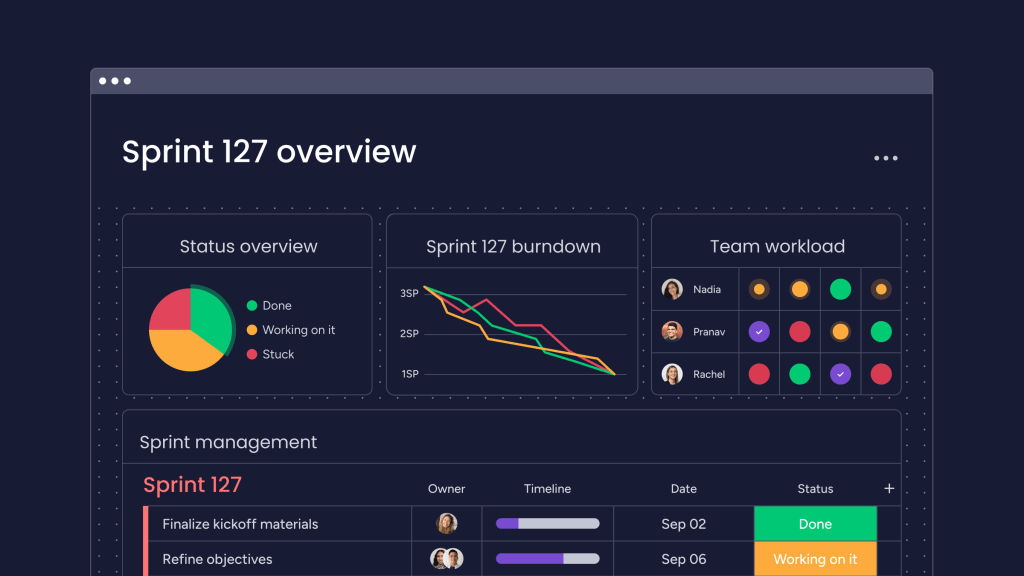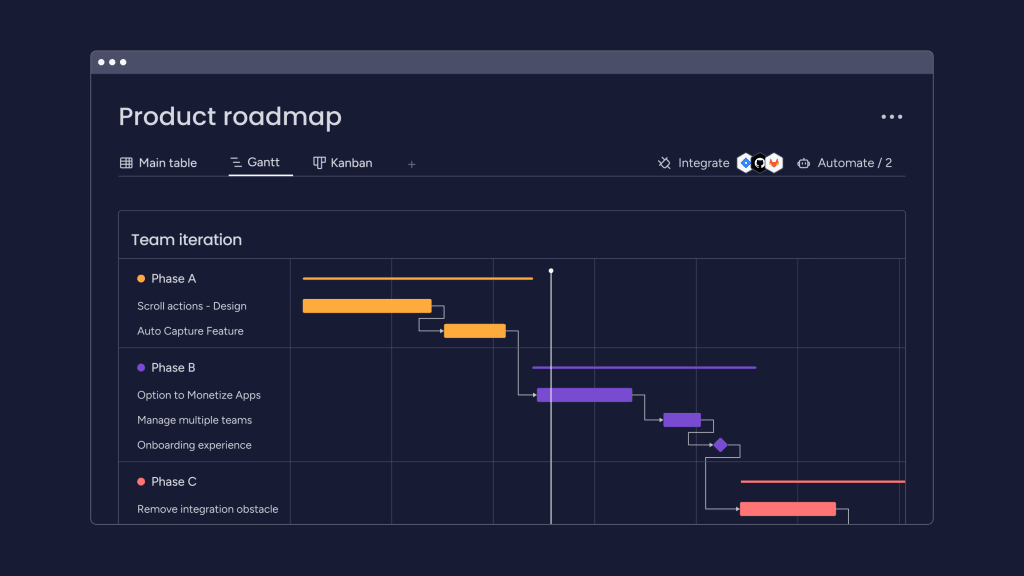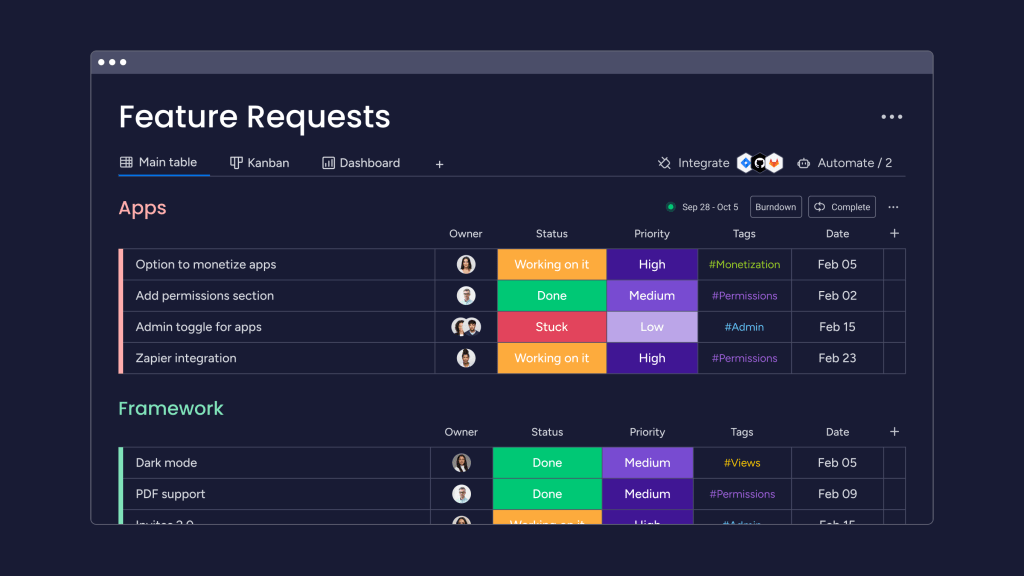The four Agile values, as outlined in the Agile Manifesto, guide agile product development projects. Although conceived by software engineers, these values have revolutionized project management methodologies in various industries, promoting iterative development, customer involvement, and adaptability.
However, they’re not a methodology, framework, or set of rules — but guidelines to help you improve your way of working.
In this guide, you’ll learn all about Agile values, why they matter, and how to embrace them in your development projects. Plus, we’ll introduce monday dev, built upon monday.com Work OS, enabling product and development teams to embody the Agile values.
What are the 4 Agile values?
The Agile Manifesto — documented by a group of software developers in 2001 — outlines four core values that underpin the Agile approach to software development. These values prioritize certain aspects over others to enhance agility and responsiveness in the development process. The four Agile values are:
- Individuals and interactions over processes and tools.
- Working software over comprehensive documentation.
- Customer collaboration over contract negotiation.
- Responding to change over following a plan.
As the Manifesto states: “While there is value in the items on the right, we value the items on the left more.” In other words, while the right side is good, the left is even more valuable.
What are the 12 Agile principles?
Before expanding on the Agile values, we should mention the Agile principles. The Agile Manifesto also lists 12 principles to help software developers get products to market faster. The principles reinforce and extend the Agile values of customer satisfaction, collaboration, adaptability, and continuous improvement.
You can read more about the 12 Agile principles in our guide.
Why are the 4 Agile values important?
Although the Agile Manifesto was written over 20 years ago, the values and principles still hold true. In fact, you could say they were written ahead of their time.
It’s important to remember that the Agile values are not hard and fast rules but a philosophy or mindset around developing software and products. Since writing the Agile Manifesto, some of the authors have used the values and principles to shape popular agile methodologies, such as Scrum. Read here for more about scrum, and scrum values.
Let’s dive a little deeper into the values.
1. Individuals and interactions over processes and tools
The first Agile value emphasizes valuing people and effective communication within the team over rigid processes or tools. And also prioritizes the team’s ability to collaborate and respond to business needs promptly.
In other words, processes and tools are helpful, but individuals and their interactions are even more valuable.
2. Working software over comprehensive documentation
The second Agile value focuses on delivering functional software quickly rather than extensive documentation and highlights the importance of getting software into customers’ hands for feedback and improvement.
So, creating documentation is essential, but delivering working software is more critical. It’s the driver behind delivering a minimum viable product (MVP) now rather than a “perfect product” later.
3. Customer collaboration over contract negotiation
The next Agile value advocates for continuous customer collaboration throughout the development process and shifts from a contract-driven approach to a customer-centric model, ensuring you meet customer needs effectively.
Contract negotiation covers project deadlines, budgets, and scope agreements with internal and external stakeholders. So, while discussing project requirements is essential, it’s more important to listen to your customers.
4. Responding to change over following a plan
The final Agile value encourages adaptability and flexibility by embracing change during development and prioritizes responding to evolving requirements over rigidly following a predefined plan.
Before Agile, traditional project methodologies like Waterfall were more prescriptive and resistant to change. Planning and delivering a solution could take years, by which time things had moved on. However, by responding to change, agile teams can follow a dynamic path rather than a static map. See here for our detailed breakdown of the waterfall and agile methodologies.
In the latest State of Agile Report, survey respondents who are satisfied with Agile cited tangible benefits:
- 59% improved collaboration with colleagues and customers
- 57% observed better alignment with business needs
- 25% delivered better quality software
To summarize, the Agile values promote a customer-centric, collaborative, and adaptive approach to project management, leading to improved outcomes, increased efficiency, and enhanced team performance.
How to embody the 4 Agile values with monday.com
Built on monday.com Work OS, monday dev allows teams to manage all their processes and achieve their goals faster in one easy-to-use platform. With a complete package of views, widgets, dashboards, and templates, they can collaborate on product roadmaps, feature requests, sprints, release plans, customer feedback, and backlogs.
Here are a few ways you can follow the Agile values in monday dev:
1. Track individuals and interactions on the cross-team dashboard
Prioritizing people over tools and processes fosters effective communication, teamwork, and a collaborative environment, leading to better outcomes.
With monday dev, you can use the cross-team dashboard to stay on track and manage sprints and bug tracking in one place. Check your team’s workload and capacity so you can schedule or allocate work to match timelines.

2. Monitor development progress with multiple views
Emphasizing functional software over extensive documentation ensures quicker product delivery to customers, enabling rapid feedback and continuous improvement.
With over 27 different work views, monday dev lets you keep track of every task, idea, and product update the way you want. Gain full transparency into your team’s development tasks with a drag-and-drop Kanban board. Or monitor your MVP project milestones, dependencies, and overlapping activities with Gantt charts.

3. Collaborate with customers on feature requests
Encouraging customer-centric practices over rigid contracts enhances product alignment with customer needs, reduces misunderstandings, and promotes a culture of continuous collaboration.
The more open and transparent your communication, the easier it is to create value.
With monday dev, you can quickly prioritize upcoming features by collecting and storing the product backlog with relevant feature requests.

4. Respond to changes with a sprint retrospective
Embracing change over sticking to a fixed plan allows teams to adapt quickly to evolving requirements, market dynamics, and feedback, leading to more responsive and successful outcomes.
Use the sprint retrospective board in monday dev to capture ideas in one place, keep track of what’s performing well and what isn’t, and vote on the strongest ideas for upcoming sprints.

Need a headstart? Try our sprint retrospective template.
Embrace the Agile values in your development projects
Since its inception in 2001, the Agile Manifesto has been a huge success, with an increasing number of organizations embracing its core values. These values continue to guide teams towards agility, innovation, and customer-centricity, demonstrating their relevance in modern project management.
One company that’s benefited from embracing the Agile values is financing provider Behalf. Since switching to monday.com, its R&D and Product teams have managed all their processes on one platform, from roadmaps to reporting and everything in between.
Reacting and switching priorities quickly is easy as they work through feature requests and track bugs in one main board. By streamlining its entire product development lifecycle, Behalf has saved 12,371 hours and $416,000 per year.
Why not embrace the Agile values in your development projects, starting with a free 14-day trial of monday dev.
FAQs
What are the 4 values of agile?
The four core values of Agile, as outlined in the Agile Manifesto, are:
1. Individuals and interactions over processes and tools
2. Working software over comprehensive documentation
3. Customer collaboration over contract negotiation
4. Responding to change over following a plan
What are the 5 types of values in agile?
While Agile is primarily known for its four core values, teams often emphasize additional values such as:
1. Commitment: Dedication to team goals and delivering value.
2. Focus: Concentrating on the work at hand and minimizing distractions
3. Openness: Being transparent about challenges and progress.
4. Respect: Valuing each team member’s contributions
5. Courage: Taking risks and embracing change
What are the 12 principles of Agile project management?
The 12 principles of Agile project management include:
1. Satisfy the customer through early and continuous delivery
2. Welcome changing requirements, even late in development
3. Deliver working software frequently
4. Collaborate daily with business stakeholders
5. Build projects around motivated individuals
6. Use face-to-face communication whenever possible
7. Working software is the primary measure of progress
8. Maintain a sustainable work pace
9. Pay continuous attention to technical excellence
10. Simplicity is essential
11. Self-organizing teams produce the best results
12. Reflect and adjust regularly to improve effectiveness
What are the 4 R’s in Agile?
1. Roles: Defining team responsibilities
2. Responsibilities: Clarifying what each role entails
3. Relationships: Building strong team dynamics
4. Results: Focusing on delivering value and outcomes

